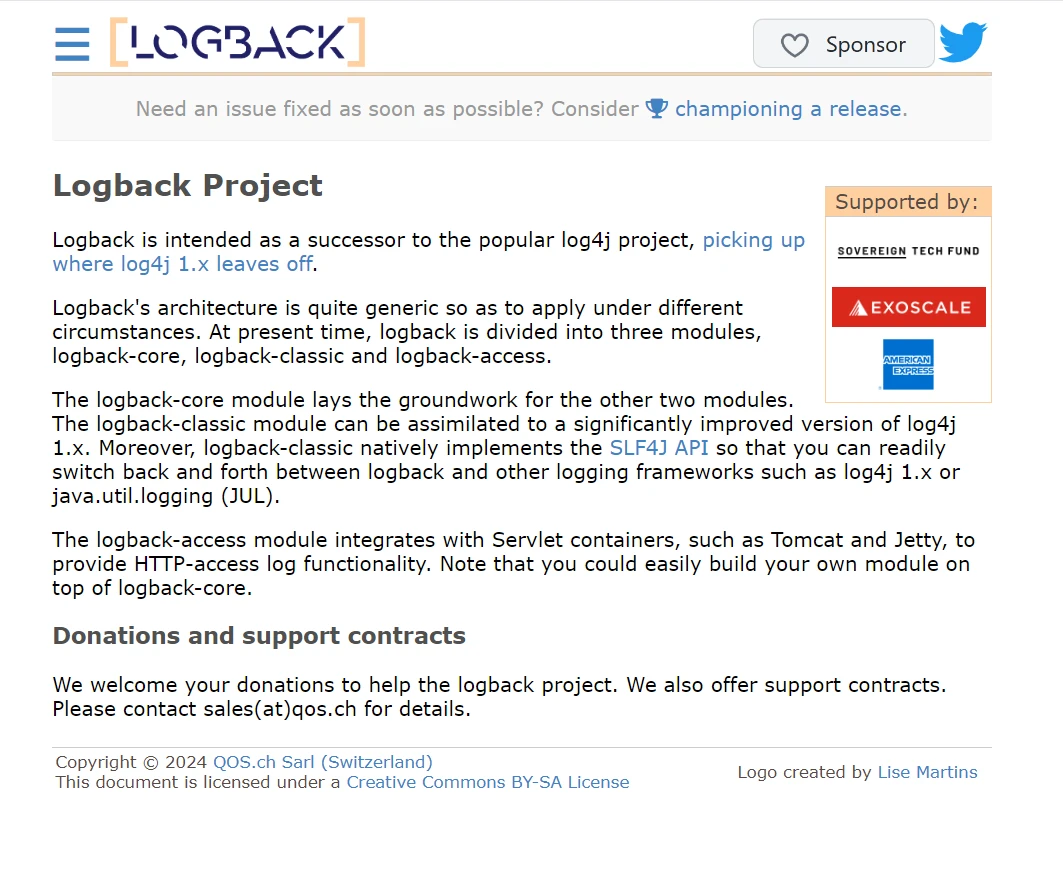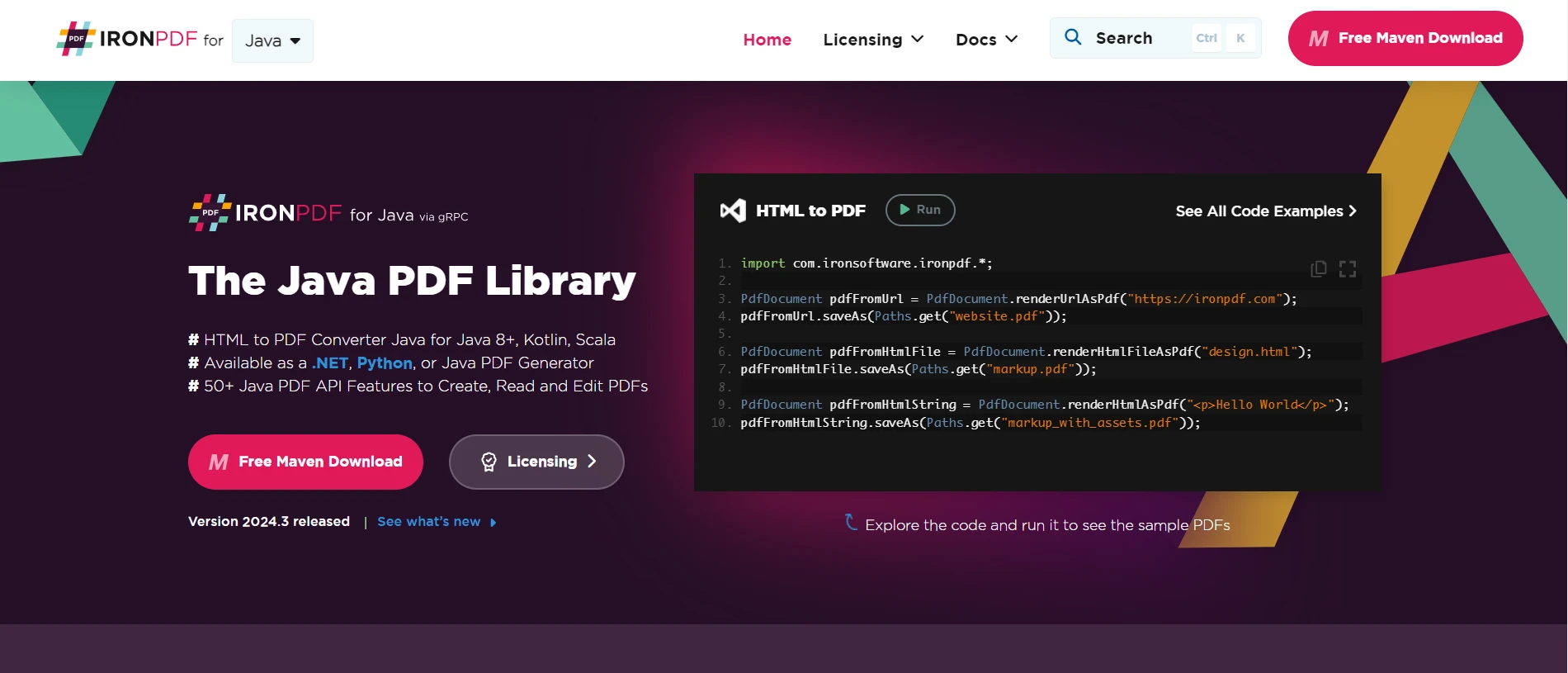Test in production without watermarks.
Works wherever you need it to.
Get 30 days of fully functional product.
Have it up and running in minutes.
Full access to our support engineering team during your product trial
In the realm of software development, a robust and flexible logging framework is indispensable. It not only provides crucial insights into the runtime behavior of applications but also aids in debugging and monitoring. Among the abundance of logging APIs available, Logback stands out as a versatile and powerful log message tool.
In this article, we look into Logback, exploring its features, configuration options, and best practices for creating seamless integration into your projects.
Logback is an open-source logging framework for Java applications, designed as a successor to the popular Log4j project. Developed by Ceki Gülcü and part of the SLF4J (Simple Logging Facade for Java) ecosystem, Logback offers high performance, flexibility, and reliability, making it a preferred choice for developers worldwide. Logback's architecture is divided into three different modules: logback-core, logback-classic, and logback-access.

Logback is a flexible framework that excels in managing log output files and logging events for Java applications. It efficiently handles old log files, preventing disk space issues through automatic rollover based on size, date, or time. By default, Logback creates a root logger that captures all log output at a specified log level, configurable via the logback.xml file, allowing developers to define multiple appenders and log levels for different packages or classes.
Configuring Logback is straightforward, thanks to its XML-based configuration format. Below is a basic configuration log file example:
configuration.xml<configuration>
<appender name="STDOUT" class="ch.qos.logback.core.ConsoleAppender">
<encoder>
<pattern>%d{HH:mm:ss.SSS} [%thread] %-5level %logger{36} - %msg%n</pattern>
</encoder>
</appender>
<root level="INFO">
<appender-ref ref="STDOUT" />
</root>
</configuration>In this configuration file:
To harness the full potential of Logback, consider the following best practices:
Logging is a critical aspect of software development, offering insights into the behavior of applications during runtime. When working with libraries like IronPDF in Java projects, for instance, integrating a robust logging framework becomes essential for effective debugging, monitoring, and troubleshooting.
IronPDF for Java, developed by Iron Software, is a powerful library designed to facilitate the creation, editing, and extraction of PDF content within Java 8+, Kotlin, and Scala projects. Building on the success of its .NET counterpart, IronPDF for Java enables developers to generate PDFs from various sources, including HTML, URLs, JavaScript, CSS, and multiple image formats. It supports advanced features such as adding headers, footers, signatures, and attachments and implementing security measures like passwords.

Utilizing gRPC for communication with the IronPdfEngine, IronPDF ensures efficient performance with full multithreading and asynchronous support. Its integration into Java projects is straightforward, requiring simple dependency configuration and setup while offering extensive functionality to meet diverse PDF handling needs.
Logback, with its rich feature set and flexibility, complements IronPDF's functionality, providing developers with comprehensive logging solutions. Here's how you can integrate Logback with IronPDF in your Java projects:
Begin by adding Logback as a dependency in your project's pom.xml file, alongside the existing IronPDF and SLF4J dependency:
<dependency>
<groupId>ch.qos.logback</groupId>
<artifactId>logback-classic</artifactId>
<version>1.5.6</version> <!-- Use the latest version -->
</dependency>
<!-- Adds IronPDF Java. Use the latest version in the version tag. -->
<dependency>
<groupId>com.ironsoftware</groupId>
<artifactId>ironpdf</artifactId>
<version>2024.3.1</version>
</dependency>
<!-- Adds the slf4j logger which IronPDF Java uses. -->
<dependency>
<groupId>org.slf4j</groupId>
<artifactId>slf4j-simple</artifactId>
<version>2.0.3</version>
</dependency>Initialize Logback's logger in your Java code to start capturing log messages. This initialization typically occurs at the entry point of your application, such as the main method:
import org.slf4j.Logger;
import org.slf4j.LoggerFactory;
public class Main {
private static final Logger logger = LoggerFactory.getLogger(Main.class);
public static void main(String[] args) {
// Add Logger Info message
logger.info("Application started...");
}
}Customize Logback's configuration to suit your logging requirements. Logback supports XML-based configuration files where you can define appenders, log levels, and format modifiers for log output. Here's a basic example of a Logback configuration file (logback.xml):
<configuration>
<appender name="STDOUT" class="ch.qos.logback.core.ConsoleAppender">
<encoder>
<pattern>%d{HH:mm:ss.SSS} [%thread] %-5level %logger{36} - %msg%n</pattern>
</encoder>
</appender>
<root level="INFO">
<appender-ref ref="STDOUT" />
</root>
</configuration>Within your application code, utilize Logback to log relevant IronPDF operations, such as PDF generation, HTML rendering, or URL-to-PDF conversions. Insert appropriate logging event statements at key points in your codebase to capture relevant information. Additionally, handle any potential logger error gracefully to ensure that logging issues do not disrupt the main application.
import org.slf4j.Logger;
import org.slf4j.LoggerFactory;
import com.ironsoftware.ironpdf.*;
import java.io.IOException;
import java.nio.file.Paths;
public class Main {
private static final Logger logger = LoggerFactory.getLogger(Main.class);
public static void main(String[] args) {
try {
// Log the start of the PDF generation process
logger.info("Generating PDF from HTML content...");
// IronPDF operation
PdfDocument myPdf = PdfDocument.renderHtmlAsPdf("<h1>Hello World</h1> Made with IronPDF!");
// Log the completion of the PDF generation process
logger.info("PDF generation completed.");
// Save the PDF document with a file name output.pdf
myPdf.saveAs(Paths.get("output.pdf"));
} catch (Exception e) {
// Log any errors that occur during the PDF generation process
logger.error("An error occurred while generating the PDF: ", e);
}
}
}Logback's default behavior ensures that logging events are always logged and directed to the same file unless configured otherwise, providing consistent and predictable logging output.
Explore Logback's advanced features such as logging levels, logging to existing files, filtering, and context-aware logging to enhance the granularity and usefulness of your logs. Utilize MDC (Mapped Diagnostic Context) for correlating log messages across distributed systems or NDC (Nested Diagnostic Context) for hierarchical logging contexts.
To increase your knowledge of IronPDF, please visit the IronPDF Documentation. IronPDF itself uses SLF4J for logging output. Please check the IronPDF Code Examples and IronPDF API Reference pages for further details.
Logback stands as a reliable companion in the journey of software development, offering a robust logging solution with unparalleled flexibility and performance. By leveraging its features and adhering to best practices, developers can streamline logging workflows, enhance application observability, and expedite the resolution of issues in production environments.
By integrating Logback with IronPDF in Java projects, developers can elevate their logging practices, gaining deeper insights into application behavior and facilitating efficient debugging and monitoring. Leveraging Logback's flexibility and IronPDF's capabilities, developers can create robust and informative debug logs, empowering them to build resilient and maintainable software systems.
IronPDF for Java offers a free trial and provides an affordable option starting at $749. Download IronPDF for Java and give it a try!